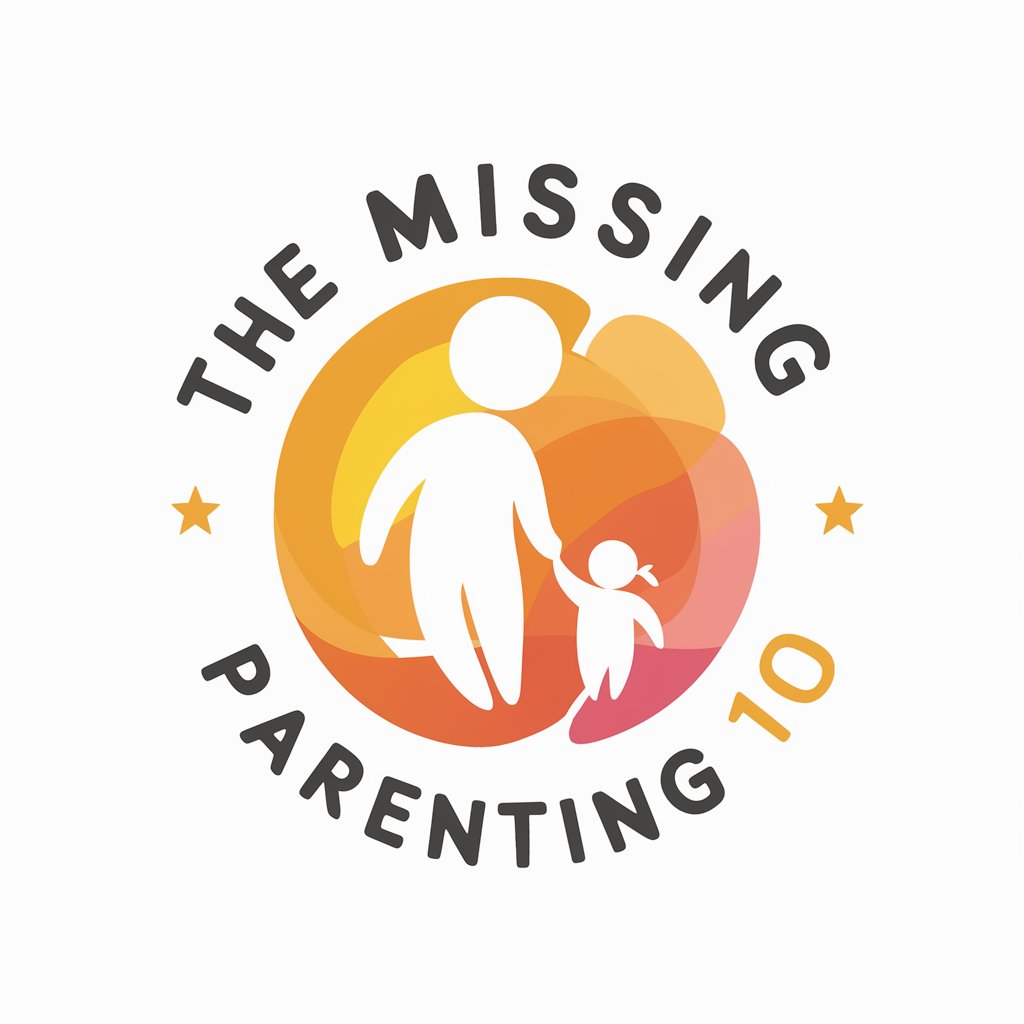The Missing Parenting 101 - personalized parenting guidance

Hello! Let's make parenting a bit easier and a lot more fun.
Empowering parents with AI-driven advice
How can I stay calm when my toddler is throwing a tantrum in public?
What activities can I plan for a rainy day with my 3 and 5-year-old children?
How do I address sibling rivalry between my 8 and 10-year-old kids?
What are some effective ways to encourage positive behavior in my teenager?
Get Embed Code
Understanding The Missing Parenting 101
The Missing Parenting 101 is designed as a specialized guidance and support system for parents and guardians navigating the complexities of parenting. Its primary aim is to offer practical advice, emotional support, and creative solutions to everyday parenting challenges. It operates on a foundation of empathy, humor, and evidence-based strategies to promote positive parent-child interactions. A key feature is its ability to offer tailored advice for different stages of a child's development, recognizing the unique challenges that come with each phase. For example, it can provide strategies for managing toddler tantrums with compassion, or advice on fostering independence in teenagers. The service is grounded in the philosophy that parenting is not just about managing behavior, but also about understanding and responding to the emotional and psychological needs of children. Powered by ChatGPT-4o。

Core Functions of The Missing Parenting 101
Emotional Regulation Advice
Example
Teaching parents the 4-7-8 breathing technique to manage stress before addressing child behavior.
Scenario
A parent is struggling with frustration due to their child's repeated refusal to follow instructions. The service suggests the parent first calm themselves using the breathing technique, ensuring they can approach the situation with patience and clarity.
Activity Planning Assistance
Example
Providing age-appropriate activity ideas for children of various ages.
Scenario
A parent with a 3-year-old and a 7-year-old is looking for weekend activities that can engage both children. The service offers a list of activities, such as a simple kitchen science experiment and a family nature hike, that cater to both age groups and encourage learning and bonding.
Parenting Strategy Guidance
Example
Advising on positive discipline techniques without shame.
Scenario
When a child is caught lying, the service suggests a conversation framework that focuses on understanding why the child felt the need to lie and how to build trust, rather than punitive measures.
Emotional Intelligence Development
Example
Helping parents foster their child's emotional intelligence by teaching them to name and manage their feelings.
Scenario
A parent is concerned about their child's frequent outbursts of anger. The service recommends ways to help the child articulate their feelings and strategies for coping with anger in a healthy manner.
Who Benefits from The Missing Parenting 101?
New and Expectant Parents
Individuals stepping into parenthood for the first time or expecting another child, seeking guidance on how to navigate the early years, from infancy through toddlerhood, effectively.
Parents of Toddlers and Preschoolers
Guardians facing the challenges of the 'terrible twos,' potty training, and early childhood education. They benefit from advice on discipline, engagement, and fostering independence.
Parents of School-Aged Children
Those who are navigating the academic and social pressures their children face, looking for strategies to support their child's education, self-esteem, and peer relationships.
Parents Seeking Alternative Discipline Methods
Parents interested in non-traditional discipline methods that focus on emotional intelligence and positive reinforcement, aiming to cultivate a cooperative and respectful parent-child relationship.

How to Use The Missing Parenting 101
Start Your Journey
Begin by visiting yeschat.ai to access a free trial of The Missing Parenting 101 without the need for login or subscribing to ChatGPT Plus.
Identify Your Needs
Reflect on your current parenting challenges or goals. Whether you're dealing with tantrums, seeking communication strategies, or looking for educational activities, having a clear objective will enhance your experience.
Engage with the Tool
Utilize the prompt box to ask specific questions related to parenting. For more effective advice, mention the age of your child or children and the particular situation you are facing.
Apply the Advice
Implement the strategies and suggestions provided. Remember, consistency and patience are key in parenting. Adjust the advice to fit your child's unique needs and your family dynamics.
Review and Reflect
Take time to reflect on the outcomes of applying the advice. Consider revisiting the tool for further guidance or to address new parenting challenges as your child grows.
Try other advanced and practical GPTs
Profile Perfectionist
Elevate Your Profile with AI-Powered Precision

Human Writer
Unleash Creativity with AI-Powered Writing

TateGPT
Empower Your Life with AI Wisdom

MrBeastGPT
Elevate Your YouTube Game with AI-Powered Strategies

Thumbnail Wizard
Elevate Your Thumbnails with AI

1 Out Of 10 Idea
Elevate Your YouTube Game with AI Creativity

QB1
Craft Your Perfect Cocktail with AI

Sfia
Empowering Digital Transformation with AI

GPT Advertising · Global
Connect, advertise, and grow with AI

/search
AI-powered exploration at your fingertips.

AI Outsmarts Humanity
Master Debating with AI Precision

Body Explorer
Explore the Human Body with AI

Frequently Asked Questions about The Missing Parenting 101
What makes The Missing Parenting 101 different from other parenting advice tools?
The Missing Parenting 101 leverages AI to offer personalized, situation-specific advice that evolves with your family's needs. Its foundation in a variety of parenting philosophies ensures a well-rounded approach.
Can I use this tool for advice on toddlers and teenagers?
Yes, The Missing Parenting 101 is designed to provide support for parents of children of all ages, from toddlers to teenagers. The advice is tailored to the age-specific challenges and developmental stages.
How often can I use The Missing Parenting 101?
You can use it as often as needed. It's available 24/7, providing flexibility to seek guidance at any time, whether for immediate concerns or long-term parenting strategies.
Is the advice from The Missing Parenting 101 based on scientific research?
Yes, the tool draws on a wide range of sources, including established parenting books, psychological research, and expert opinions, to offer evidence-based advice.
How can I ensure I'm implementing the advice effectively?
For optimal implementation, consider the context of your unique family situation, be consistent with strategies, and be patient with yourself and your child. Adapt the advice as needed and observe your child's responses for cues.
